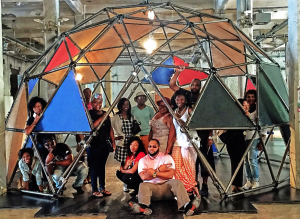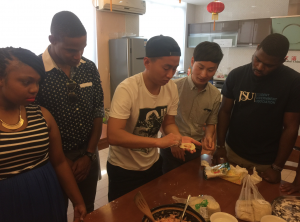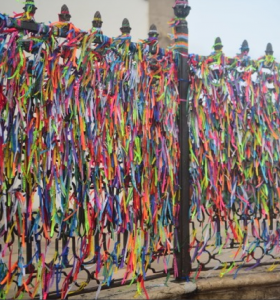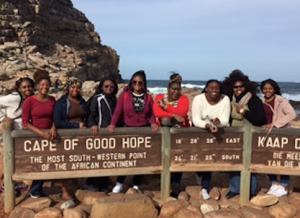 Jackson State University’s award-winning Passport to the World (PTTW) program invites students to transcend international limitations on academic, professional and social levels. Through world travel and interaction with people from different backgrounds, students can heighten their cultural awareness and increase their relevance in a global economy.
Jackson State University’s award-winning Passport to the World (PTTW) program invites students to transcend international limitations on academic, professional and social levels. Through world travel and interaction with people from different backgrounds, students can heighten their cultural awareness and increase their relevance in a global economy.
Although the racial makeup of participants studying abroad is typically Caucasian, JSU students and faculty continue to diversify the landscape. The program has recently increased their student participation by more than 35 percent.
Dr. Priscilla Slade, special assistant to the provost for International Studies and Community Colleges, said, “JSU Global’s Passport to the World program literally transports the classroom to an area of the world that provides new perspectives and hands-on experiences relevant to the subject matter being taught.”
According to the program description, PTTW is a 4-week faculty-led international experience that includes organized cultural, research, and experiential learning activity. Students spend two weeks abroad and two weeks on Jackson State’s campus.
Jennifer Butler, coordinator for JSU Global study abroad, believes the program offers both immediate and long-term benefits.
“Students who fully embrace the experience and immerse themselves in the culture and society of countries outside of the U.S. gain a greater understanding of the importance of becoming “global leaders” – a role which is stated in the JSU Mission Statement,” Butler said.
“In addition, studies have shown that students who study abroad have better academic success, including higher graduation rates, and are identified as being more attractive to prospective employees on the job market.”
Last month, PTTW students returned from Spain, China, Brazil and South Africa after two weeks of cultural and academic enlightenment.
[hr]
GLOBAL ITINERARY
Slade explains that Passport to the World 2016 provided students the following opportunities:
- In Shanghai, China: Students were exposed to the structure of Asian economies and factors that shape the development of a nation such as religion and culture.
- In Madrid, Spain: Students were exposed to the historical, political, economic, technological, and cultural issues that affect educational perspectives of society and the educational systems.
- In Salvador da Bahia, Brazil: Students were provided Afro-Brazilian experiences that served as a research catalyst to develop polished graphic design projects using industry standard software. In addition, students studied Brazilian health disparities and were able to compare and contrast with that of the United States.
- In Cape Town, South Africa: Students examined issues of public health from the perspective of a developing country. They compared access to health systems in the United States with those in South Africa from a variety of perspectives.
[hr]

Madrid, Spain
Keleigh Williams, a JSU psychology major, visited Madrid with the intentions of broadening her international horizons and putting her minor in Spanish to use.
“I wanted to get in some practice. I helped some of the other students make their way around the city, and it made it a lot easier to get to places reading the street signs and all that.”
Williams and her group toured provincial schools, learning the educational differences between Spain and the U.S.
“We really spent a lot of time learning the benefits of a bilingual education. In some schools, they are learning three languages. In one school, they were learning English, Spanish and Chinese – even the 3-year-olds were learning it,” Williams said.
“I definitely think our government and policymakers, you know whoever writes our standards for schools, should look at what other countries are doing and try to bring that into our curriculum,” she added.
A highlight of the trip for Williams was watching people native to the region perform at a Flamenco show. Her favorite stop was at the Royal Palace, “ … It was so breathtaking, and I wanted to have so many pictures to bring back to the school, but we couldn’t take any,” she said.
Williams was also pleased with the local cuisine. “Everything tasted like straight from the ocean or straight from the farm. They don’t eat a lot of processed food. They have this dish called paella; it’s like a Saffron rice dish, but you can get it with shrimp or clams, chicken, whatever meat they put in it, and it tastes like someone made it in your house and served it to you.”

Shanghai, China
Dr. Ramin Maysami, dean of Jackson State’s College of Business, said “… understanding of internationalization of business practices is the key to success for business professionals. And the College of Business trip to Shanghai, China, the second largest economy in the world, brings knowledge and skills together to teach students just that.”
Sophomore Damian Murray, 19, was one of nine JSU students who endured a 17-hour flight to Shanghai, China. Upon his arrival, Murray said he felt as if he were in shock.
“Everything was so different. It was so unlike America. It was something I could never imagine. You hear stories about places. You hear what you see on TV and the news, but you rarely think you’re actually going to go to places like China.”
Murray’s group learned Tai Chi, calligraphy and received a crash course in the Chinese language during their stay. They even toured multinational companies in addition to attending classes in Asian economics at a local institution.
“From what I saw and what I heard, their education is stricter. You don’t get to ask questions when you’re in a Chinese classroom; most students wait until after the class and line up for the teacher to ask their questions,” Murray said.
Murray, a finance major, was disappointed with what seemed to be a lack of creativity offered by their curriculum. He states, “There is not much emphasis on arts, music or different stuff like that.” But similar to Williams’ experience in Madrid, Murray noticed a focus on bilingual abilities.
“They start out early, too. They start out in kindergarten studying math and English. Not their language, but our language,” he said.
A pivotal occasion for Murray was during their last night in Shanghai. The entire group shared their personal observations of the trip over a group dinner, “Everything we experienced kind of culminated at this dinner. We got to eat with the people over the program in China … and your classmates are kind of like your family now. Two weeks out the country with them, you’ll never forget a trip like this,” Murray said with awe and elation.

Salvador Bahia, Brazil
Senior Akilah Adams cannot get enough of her trip to Salvador Bahia, Brazil. The senior healthcare administration major said, “I’m already planning to go back after I graduate. I’ve been looking into starting a career in global public health upon receiving my master’s degree.”
“I hope the next time I go back I am able to do some community service. That would be my sole purpose,” Adams said.
Like others, Adams did not know what to expect from her study-abroad destination and was stunned by how much she and the Brazillian residents resembled each other.
“The population is primarily of African descent and that’s something I had not known before going to Brazil. It was such a beautiful thing for me to see and experience so many of … ‘my people’ in another country. I had no idea that Brazil had more people of African descent than the United States,” Adams said.
Recalling an emotional moment, she describes her group going to the Favela, also known as the “Brazilian slums,” and interacting with the local children.
“What really got me was … when we finished playing soccer with them they actually gave us their soccer ball. It was just a humbling experience to see people who have nothing, not even shoes on their feet, give their last – a soccer ball – to us.”

Before leaving the U.S., Adams and several students returned to the Favela and dropped off two goalies and soccer balls for the children.
Adams, who is majoring in healthcare administration, said she is forever changed by her time in Brazil. Overall, she firmly feels that PTTW improves the lives of the students who participate in their study-abroad program.
“I would like to thank Jackson State University for Passport to the World. I would like for this interview to encourage others to not only serve their community but also go out there and get out of your comfort zone and serve other communities in other countries. Learn and experience as much as you can.”






